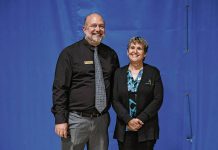Nine months after investing $11 million to obtain 800 acres of farmland near Garden City, Columbus Regional Health is forming a land use committee to determine what to do with the property.
The 10 committee members will include three trustees of Columbus Regional Health, as well as executive, facilities and architecture consultants representing the hospital, spokeswoman Kelsey DeClue said.
Since members are still being recruited, only Columbus Regional Health president and CEO Jim Bickel, as well as facilities director Dave Lenart, have currently been confirmed as hospital representatives on the committee, DeClue said.
But other members will include Columbus Mayor Jim Lienhoop, Bartholomew County commissioner Carl Lienhoop, and a local economic development official, she said.
[sc:text-divider text-divider-title=”Story continues below gallery” ]
Carl Lienhoop is especially qualified to have a committee seat because he once lived on a section of the property, commissioners chairman Larry Kleinhenz said.
The 800 acres — south of Jonathan Moore Pike, west of State Road 11 and north of the Bartholomew County 4-H Fairgrounds — were purchased March 2 by Southeastern Indiana Medical Holdings, a Columbus Regional Health holding company, from Garden City Farms LLC.
Much of the land is known locally as the Stadler Farm, county commissioner Rick Flohr said.
With its rail access, this land has been in great demand for decades, and has the potential of becoming a fully developed business park, Kleinhenz said.
When the land acquisition was announced, some acreage was described by hospital officials as shovel-ready sites for industry. However, CRH officials said some of the property could also be set aside for housing.
The deal to acquire the property includes a stipulation that up to 110 acres will be sold back to one of the Stadler heirs, Kleinhenz said.
Until development of the property commences, the new owners expected to continue renting the crop land to the Daily family, hospital officials said when the purchase was announced.
The land use committee will be examining a variety of potential land uses during two different phases, DeClue said.
Following its organizational meeting in January, the committee is expected to spend about six months on the first phase, which will focus on researching and defining the best areas for medical services, DeClue said.
Since most of the city’s growth is on the west side, CRH has been taking steps to better serve people who live or work in those growth areas. Since the massive floods of 2008, which closed Columbus Regional Hospital for 5 months, hospital officials have often pointed out that its 30-acre, east-side campus on 17th Street — the health facility’s location for 100 years — is landlocked and doesn’t allow for significant, cost-effective growth.
While between 90 and 150 acres will receive initial consideration for the location of new medical facilities, the committee will eventually whittle down its requirements to a “more concrete level,” DeClue said.
As the acreage is evaluated, top concerns will include visibility, access, elevation and drainage, she said.
“We will also have to be taking into account the issue of noise — especially with the proximity of rail service,” DeClue said.
After the committee determines where future medical facilities would go, the committee would then move into Phase Two — likely in the middle of next summer, DeClue said.
That’s when the committee would bring in an outside development consultant to help evaluate the rest of the property for its economic development potential, the hospital spokeswoman said.
The hsopital system said it is finalizing an agreement with Design Workshop to serve as that consultant. Founded in 1969, Design Workshop has offices in eight major U.S. cities, as well as in Beijing and Dubai.
The second phase will use the same type of process frequently used in Columbus to determine developments, which DeClue says involves soliciting and considering extensive input from the community.
At this time, a timeline has not been established for completing the Phase Two visioning process that will likely be overseen by Design Workshop personnel, DeClue said.
The hospital system is hopeful that the committee and its consultant will be able to tie the two-phase project together in a way that best serves the entire community, DeClue said.
The 800-acre property isn’t the only one under hospital control that is being evaluated for usage. In July 2017, CRH bought the 20-acre Clarion Hotel and Conference Center property on Jonathan Moore Pike for future development that could include an outpatient center, medical office space or urgent care.




